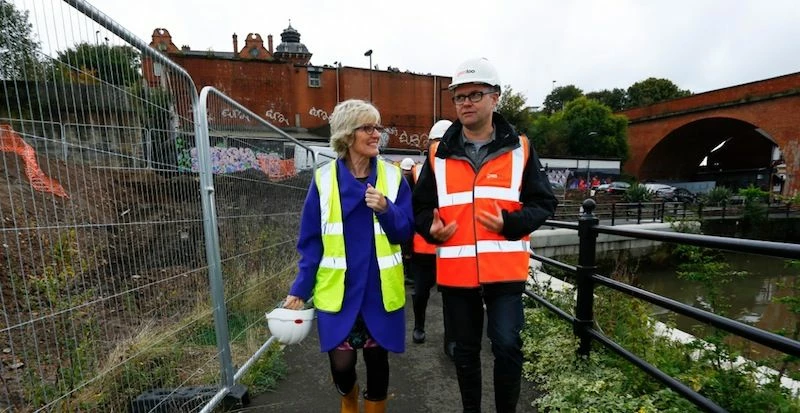
Partner Article
Northern regeneration offers investors real opportunity says built environment chief
Arguments that suggest regeneration in Northern towns and cities is futile - are wrong, a built environment expert has told Bdaily.
David Roberts, deputy chief executive of igloo Regeneration, says investors need to open their eyes to opportunities for real returns in the North, that outshine prospects in the South East - already teeming with prospectors and foreign money.
A recent article in The Economist suggested residents of declined areas such as Middlesbrough should be encouraged to move to more prosperous parts of the country.
The piece re-ignited sentiments expressed in right wing think-tank Policy Exchange’s 2008 report ‘Cities Unlimited,’ which suggest regeneration policies in the North had failed.
Speaking to Bdaily, David said the debate was often framed around a large chunk of public money being spent on an “island” of regeneration such as a library or museum building that stands alone without proper market support.
He said joined-up approaches to regeneration that set out long term plans and do not create developments in isolation are paying dividends for many Northern towns and cities.
David said: “We work with the fund management industry. Most of the funds are based in London and most of the fund managers are therefore southern. The North East is a long way away, and it’s very easy for them to accept the line that Middlesbrough or Sunderland is too difficult to regenerate.
“We would say this: as investors, you’re looking to make a return and keep a balanced portfolio. It’s actually a challenge to make an acceptable level of return in the hotbed that is London and the South East. Land prices are higher, speculators are everywhere and foreign money is coming in fast.”
David talks about the concept of ‘place making’ as central to attracting investment. This is the holist approach to regeneration that incorporates social development from community interaction through to nutritional wellbeing.
Igloo specialise in projects that require heavy remediation work and pose significant social challenges too. Most recently David and his team have worked on The Malings housing development in the Ouseburn area of Newcastle which will deliver 76 homes.
He added: “We recognise that urban regeneration is about much more than just property development. Fundamentally we’re here to make money for our investors, but we do that by doing projects that address the social and economic needs of the neighbourhood we’re trying to develop.”
“The right approach to place making can deliver returns for investors. If you look at The Malings in Ouseburn, it’s a £40 million project for which planning permission was difficult. It’s surrounded by areas that need regeneration and to a certain extent our initial residents there will be ‘urban pioneers.’ However, we believe they will receive a better return on investment as we roll out the other phases of the project.”
David explained that developing a framework for a regeneration project is essential and while the profit level from the initial stages of the project may be very low - the quality sets a benchmark for the area. Subsequent developers are then required to respond to that quality.
He added: “This is why projects such as the Toffee Factory have been so successful. An integrated development programme has followed the construction.
“We’ve been really impressed with Newcastle Council’s commitment to this and we’d hope it can be replicated elsewhere in the region.”
David said availability of mortgages for house buyers has started a positive trickle down of money in the industry, but dismissed the idea of a housing bubble in the North.
“I don’t think we should be worried about a bubble in the North as it’s a positive to have money available to buyers. What we do need to look at is developing ways for people to live in a good quality home without necessarily having to buy it.
“We’re working on a longer term private rented model which would fit into the broader regeneration plans.
“We’re saying the standard volume house building model isn’t the only route for people who want to buy a home.”
This was posted in Bdaily's Members' News section by Tom Keighley .
Enjoy the read? Get Bdaily delivered.
Sign up to receive our daily bulletin, sent to your inbox, for free.








 Raising the bar to boost North East growth
Raising the bar to boost North East growth
 Navigating the messy middle of business growth
Navigating the messy middle of business growth
 We must make it easier to hire young people
We must make it easier to hire young people
 Why community-based care is key to NHS' future
Why community-based care is key to NHS' future
 Culture, confidence and creativity in the North East
Culture, confidence and creativity in the North East
 Putting in the groundwork to boost skills
Putting in the groundwork to boost skills
 £100,000 milestone drives forward STEM work
£100,000 milestone drives forward STEM work
 Restoring confidence for the economic road ahead
Restoring confidence for the economic road ahead
 Ready to scale? Buy-and-build offers opportunity
Ready to scale? Buy-and-build offers opportunity
 When will our regional economy grow?
When will our regional economy grow?
 Creating a thriving North East construction sector
Creating a thriving North East construction sector
 Why investors are still backing the North East
Why investors are still backing the North East